Operational customer relationship management (CRM) systems focus on offering features that streamline and automate sales activities, not to mention revenue operations (RevOps). The best solutions have affordable data management tools that are customizable for any business, plus extensive workflow automation capabilities, such as task reminders or appointment scheduling tools.
Based on our evaluation, the nine best operational CRM platforms include the following:
- HubSpot CRM: Best for revenue management
- Bitrix24: Best for project-based small businesses
- Freshsales: Best for communication tools
- Zoho CRM: Best for managing leads at no cost
- Pipedrive: Best for sales automation
- Salesforce: Best for business health reporting
- monday CRM: Best for ease of use
- Copper CRM: Best for Google apps integration
- Insightly CRM: Best for contact management
Best Operational CRM Systems Compared
Provider | Free Plan? | Our CRM Rating Out of 5 | |
|---|---|---|---|
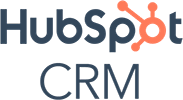 | ✓ Five users | $15 per user | 4.65 |
✓ Unlimited users | $49 for five users | 4.50 | |
✓ Three users | $9 per user | 4.36 | |
 | ✓ Three users | $14 per user | 4.30 |
✕ | $14 per user | 4.25 | |
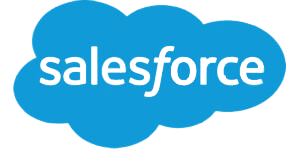 | ✕ | $25 per user | 4.22 |
 | ✕ | 4.16 | |
✕ | $9 per user | 4.03 | |
 | ✓ Two users | $29 | 3.99 |
HubSpot CRM: Best for Managing RevOps
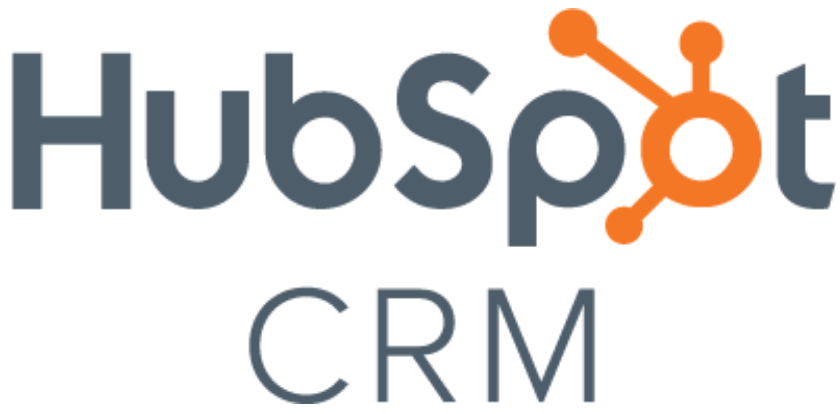
Pros
- The Customer Platform includes all-in-one sales, marketing, and service features ideal for RevOps.
- It has a robust free plan with custom quotes, Slack integration, and document storage.
- It has a highly acclaimed system for its simplicity and ease of use.
Cons
- There is a huge price jump from Starter ($15 per user, monthly) to Professional ($1,080 per month for five users) tiers.
- Forecasting is not included until the Professional plan ($1,080 per month for five users).
- It has no free automation features.
- You need an all-in-one CRM for your RevOp: Evolved from a traditional sales operation, revenue operations (RevOps) is becoming a popular structure that combines sales, marketing, and service functions into one business unit. HubSpot CRM is excellent for aligning strategies and sharing resources across these teams as it includes a Sales, Marketing, and Service Hub in its suite.
- You’re looking for a free operational CRM: HubSpot CRM is considered the best free CRM that can fulfill many day-to-day operational needs while allowing you to scale efficiently. Users get no-cost access to quote generation, document storage, email marketing, meeting scheduling, and a products library module. The Free plan also allows for third-party integrations, including Slack for collaboration and task updates.
- You want more affordable sales forecasting tools: For a sales manager, forecasting is crucial to properly planning rep capacity and a growth strategy. Unfortunately, HubSpot does not include forecasting tools until the Professional plan, which costs $1,600 per month.
- Alternative: Zoho CRM offers much more cost-friendly forecasting that’s just $14 per user, monthly under its Standard plan.
- You need affordable workflow customization and automation: There’s no better operational productivity hack than workflow automation that autocreates or updates CRM records, assigns tasks, or sends communications based on triggers. While you’ll find these in HubSpot CRM, you’ll need the Professional plan to access these features for $1,080 per month for five users.
- Alternative: Freshsales has a workflow automation feature you can tailor to your business or team setup under its Growth plan, for only $9 per user, per month.
HubSpot CRM Pricing Plans*
*Pricing is based on annual billing on a per-month breakdown of the Customer Platform. Monthly billing is available for a higher cost. While we update pricing information regularly, we encourage our readers to check current pricing here.
**Customer Platform includes sales, marketing, customer service, content, operations, and commerce software bundled in one plan. Individual modules can be purchased for lower prices.
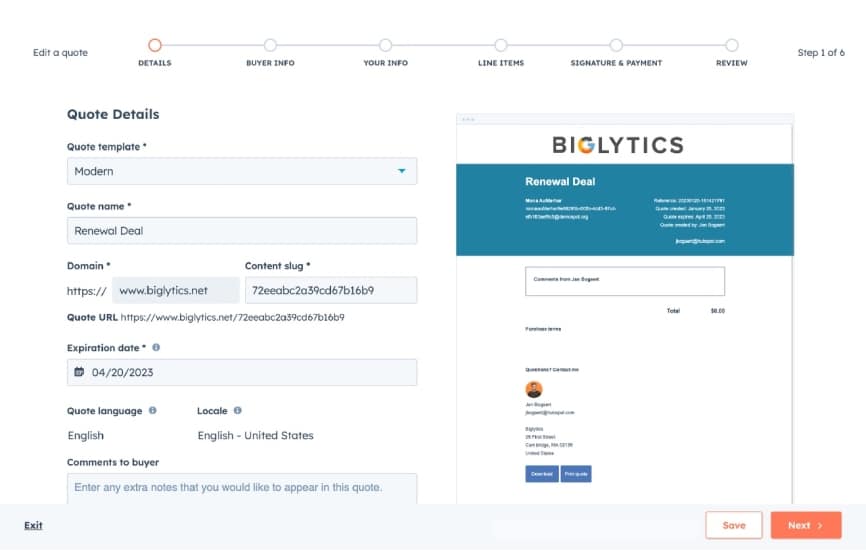
HubSpot CRM’s form for free quote generation (Source: HubSpot)
Our Expert Opinion
HubSpot CRM’s Customer Platform is our best operational CRM for small businesses. As an all-in-one sales, marketing, and customer service management system, RevOps teams can align their resources and strategies so they can scale efficiently. Many vital RevOps features, including quote generation, document management, email communications, and appointment scheduling, are even free.
Bitrix24: Best Operational CRM Software for Project-based Businesses

Pros
- It has a built-in project management module across all plans.
- Its Free plan allows unlimited users with data duplicate detection, e-signatures, and live chat engagement.
- It has a great collaboration system that has a shared team calendar, company drive for sales resources, and internal chat tools.
Cons
- It has a high learning curve for operating the features and navigating the interface.
- Mass text and email require the Standard plan ($99 per month).
- There is a huge price gap between tiers (e.g., Free to Basic at $49 per month).
- You are a project-based business: Tracking sales deals and projects in one system is convenient for keeping a sales operation in sync. Bitrix24 includes a built-in project management module on its free-forever plan. Once a deal is closed, teams can oversee milestones and tasks associated with a client project. These features are especially useful for content creation, consulting, and trade contracting businesses.
- You need robust data management tools: Bitrix24 offers users a high storage capacity on the Free plan, including unlimited contacts and deals. It also allows storage of different record types like clients, inventory, projects, products and services, and leads. Finally, Bitrix24 has excellent data management tools, like free automated duplicate detection, custom fields, and file editing within the CRM.
- You need a simpler CRM solution: While it comes with great features, Bitrix24 gets poor reviews in terms of product usability. Users find the interface difficult to navigate, and the built-in tools have a steep learning curve.
- Alternatives: monday CRM takes the crown for best operational CRM for ease of use. It has a simple interface that appeals even to true beginners. On the other hand, Copper CRM has a familiar interface similar to Google apps, which is highly intuitive.
- You want lower-priced email marketing features: While users can access email integrations on the Basic plan, deploying bulk email campaigns is not included until the Standard plan for $99 per month.
- Alternative: HubSpot CRM and Zoho CRM can save sales reps and marketing teams a lot of time by being able to send bulk emails on the free-forever plan.
Bitrix24 Monthly Pricing Plans*
*Pricing is based on annual billing on a per-month breakdown, though monthly billing is available for a higher cost. Bitrix24 offers a 15-day free trial on paid plans. While we update pricing information regularly, we encourage our readers to check current pricing here.
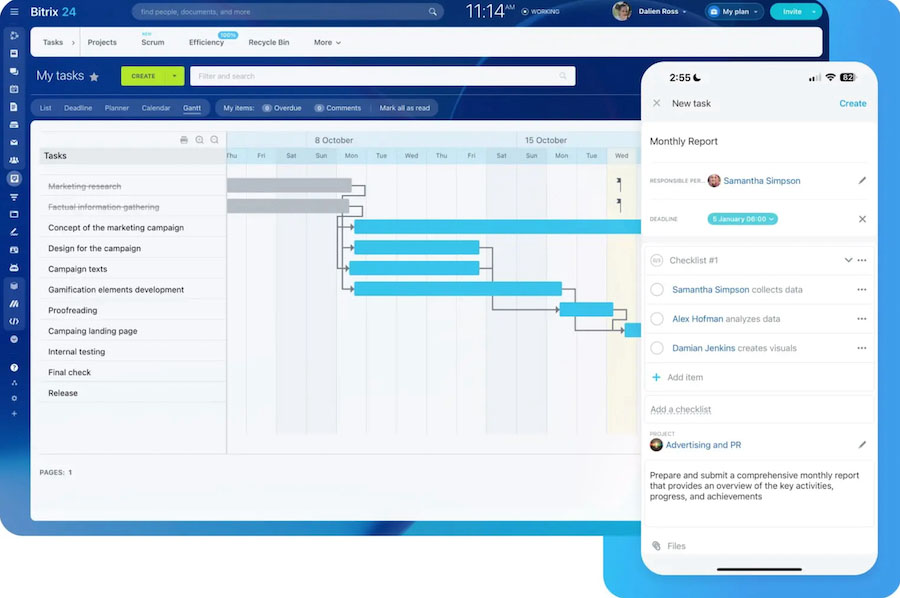
Bitrix24 project management system with Gantt chart for task monitoring (Source: Bitrix24)
Our Expert Opinion
Bitrix24’s built-in project management tool provides a centralized system to oversee the sales process and client deliverables after a closed deal. It’s an excellent free solution for optimizing sales operations while aligning sales teams with those responsible for client services. You also can’t miss the collaboration tools that streamline communication, reporting, and internal scheduling.
Freshsales: Best for Communications Tools

Pros
- Its Free plan has a built-in telephone system, chat widget, and AI chatbot builder.
- It offers solid productivity tools like an appointment scheduler, task management, and notes in records.
- It offers low-cost ($9 per user, monthly with Growth plan) workflow automation and social messaging integration.
Cons
- Automated profile enrichment is locked behind the Enterprise plan ($59 per user, monthly).
- Sales forecasting requires Pro plan subscription ($39 per user, monthly).
- Email and Slack integration is not available on the Free plan.
- You need an efficient way to manage communications: Freshsales is both a powerful CRM system and a contact center. It’s great for engaging leads and customers and tracking conversations on various channels. These channels include a built-in phone system, text, email, live chat, and automated AI chatbot. There are also integrations to use apps like Facebook Messenger or WhatsApp in the CRM.
- You want to keep individual reps more productive: As an operational CRM system, Freshsales is especially useful as a sales productivity tool. It includes free data management for contacts, accounts, and deals. It also has activity tracking and stored notes for documentation. Additionally, users can set and track individual tasks associated with CRM records and get access to a built-in appointment scheduler.
- You need more affordable data enrichment: Data enrichment is a vital operational CRM feature that ensures reps have an up-to-date database by autoupdating contact records based on online information. This tool, unfortunately, requires the Enterprise plan for $59 per user, monthly.
- Alternative: Pipedrive offers its data enrichment capabilities for just $29 per user, monthly.
- You want free Slack connectivity: Integrating a CRM with Slack keeps reps in the loop on recent sales activities by sending team members updates on deal or lead changes. Freshsales requires a paid plan for these operational capabilities.
- Alternative: HubSpot CRM offers third-party integrations, including integration with Slack for deal updates and user notifications, on the Free plan.
Freshsales Monthly Pricing Plans*
Freshsales Pricing Add-ons:
- Workflows: $5 for 10 workflows
- Phone Credits: Starts at $5
- CPQ (Configure, Price, Quote): $19 per user, monthly
- Additional Bot Sessions: $75 for 1,000 bot sessions per month
*Pricing is based on annual billing on a per-user monthly breakdown, though monthly billing is available for a higher cost. Freshsales offers a 21-day free trial for its paid plans. Pricing reflects pricing info available at the time of publishing. While we update pricing information regularly, we encourage our readers to check current pricing here.
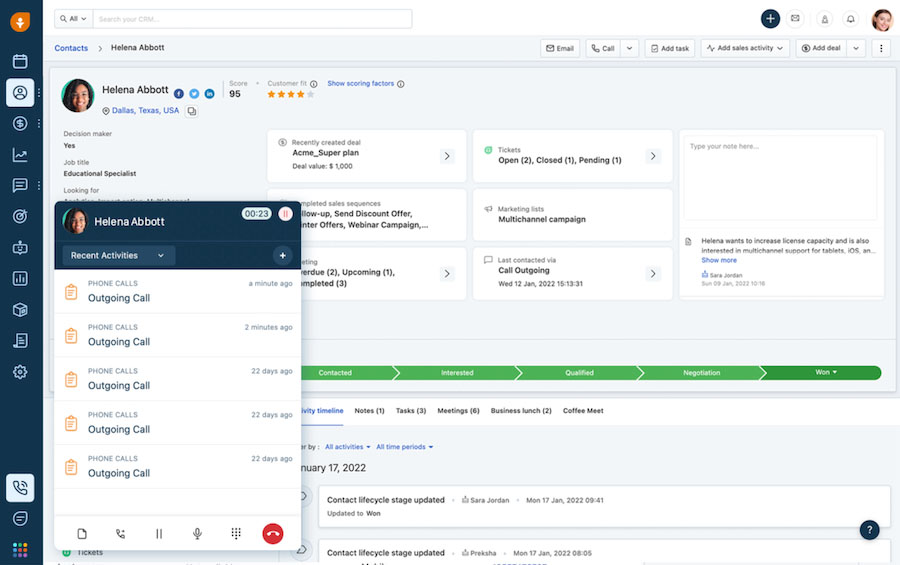
Freshsales contact record with built-in telephony (Source: Freshworks)
Our Expert Opinion
Freshsales is one of the best small business CRMs, thanks to its cost-scalability and robust sales features. In addition to vital operational capabilities like appointment scheduling, task management, and various reporting tools, this CRM is a full contact center. Between the phone system, email integrations, live chat functions, text message options, and chatbot capabilities, Freshsales is the ultimate solution to growing a business through omnichannel outreach.
Zoho CRM: Best CRM for Operations with Free Lead Management Tools

Pros
- Its Free plan includes tools for generating and managing leads.
- Workflow, task, and marketing automations are available across all plans.
- It has an omnichannel platform for engaging and nurturing leads via email, chat, phone, and social media.
Cons
- It has a steep learning curve because of its robust features and customization options.
- AI tools are locked in with higher tiers (starting at $40 per user, monthly with Enterprise plan).
- Customer segmentation and profile enrichment require Enterprise plan ($40 per user, monthly).
- You want free access to lead management tools: Zoho CRM is one of our best lead management software because of its robust tools for generating and managing leads, even with its free tier. You can also leverage its omnichannel communication platform to engage and nurture leads via email campaigns, live chat, phone calls, and social media.
- You’re seeking a CRM with robust automation features: Even with Zoho CRM’s free plan, you can access sales and marketing automation features. These include workflows, web forms for leads and contacts, and marketing campaign management. Paid plans (starting at $14 per user, monthly) allow you to use more advanced automation tools, such as autoresponders and customer segmentation.
- You need a CRM with free or low-cost AI tools: Zoho CRM offers AI tools in the form of its voice assistant, Zia. This tool provides you with intelligent automations, smart recommendations for sales activities, predictions based on sales trends, and suggestions for email content. Unfortunately, Zia is only available for higher tiers, starting with the Enterprise plan ($40 per user, monthly).
- Alternatives: Freshsales has a free plan with AI chatbot builder and analytics. If you want more affordable yet comprehensive AI features, go for Pipedrive’s Essential plan ($14 per user, monthly). Its AI Sales Assistant provides you with automated task updates, reminders, forecast assistance, and tips for performance improvement.
- You’re looking for a more affordable CRM with segmentation tools: Zoho CRM’s customer segmentation feature is locked in with its Enterprise plan ($40 per user, monthly). For small businesses, this could be a steep price.
- Alternatives: HubSpot CRM’s free plan and Salesforce’s Starter Suite ($25 per user, monthly) both offer customer segmentation. Bitrix24’s Basic plan ($49 per user, monthly) also offers sales and marketing automation with customer segmentation. While it is more expensive at first glance, it is cheaper on a per-user basis ($9.80 per user, monthly).
Zoho CRM Monthly Pricing Plans*
*Pricing is based on annual billing on a per-month breakdown, though monthly billing is available for a higher cost. Paid plans include a 15-day free trial. While we update pricing information regularly, we encourage our readers to check current pricing here.
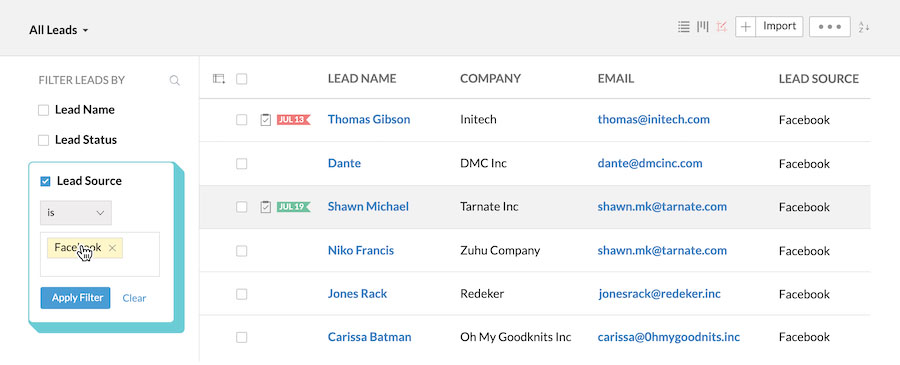
Zoho CRM lead management system with filters (Source: Zoho CRM)
Our Expert Opinion
Zoho CRM’s free plan includes tools for lead management, including web forms for lead generation, marketing campaigns for lead nurturing, and standard reports for lead tracking. You can track lead sources, status, owners, and conversions. In addition, all plans allow you to automate mundane tasks, such as email sending, lead follow-ups, and data field updates. Workflow automation helps improve the productivity of your sales and marketing teams.
Pipedrive: Best for Automating Sales Tasks

Pros
- It has robust sales system for tracking deals, managing leads, and generating proposals.
- It includes the Smart Docs feature to automate proposal generation and Smart Contact to autoupdate lead records.
- It has excellent AI capabilities for enhancing productivity.
Cons
- It has no free plan, only a 14-day free trial.
- Project management tools require Power plan ($64 per user, monthly) or add-on fee of $6.70 per user, monthly.
- Essential operation features like email integrations, appointment scheduling, and workflow automation require the Advanced plan ($29 per user, monthly).
- You want to automate the majority of your operations: Pipedrive is one of the best sales automation software products because of its end-to-end capabilities. Many pipeline stages and sales tasks can be put on autopilot, including lead generation, qualification, meeting scheduling, email nurturing, and contact enrichment. Plus, its Smart Docs tool automates proposal generation by populating pre-stored documents with contact data.
- You need robust deal tracking tools: In a sales operation, closing and managing deals is the ultimate performance indicator. No CRM offers better deal-tracking tools than Pipedrive. Teams can customize pipeline stages to meet their unique needs, create, track, and assign opportunities as they come in, and monitor deal activity. A rotten indicator feature even alerts users if a sales deal is turning cold.
- You need a free CRM system: Pipedrive, though not too expensive, does not come with a free-forever plan. Therefore, if you’re bootstrapping or simply want to try CRM software for free, you may want to consider other options.
- Alternatives: HubSpot CRM and Freshsales are two excellent operational CRMs with freemium plan options.
- You want more affordable project management features: Project management in a CRM system is convenient for overseeing sales deals and client deliverables in one interface. While Pipedrive recently started offering a project management module, it requires the Power plan for $64 per user, monthly.
- Alternatives: Bitrix24 is the best alternative with free project management capabilities. Insightly CRM is another solid pick, especially if you want to combine contact and project management in one space.
Pipedrive Monthly Pricing Plans*
*Pricing is based on annual billing on a per-month breakdown, though monthly billing is available for a higher cost. Paid plans include a 14-day free trial. While we update pricing information regularly, we encourage our readers to check current pricing here.
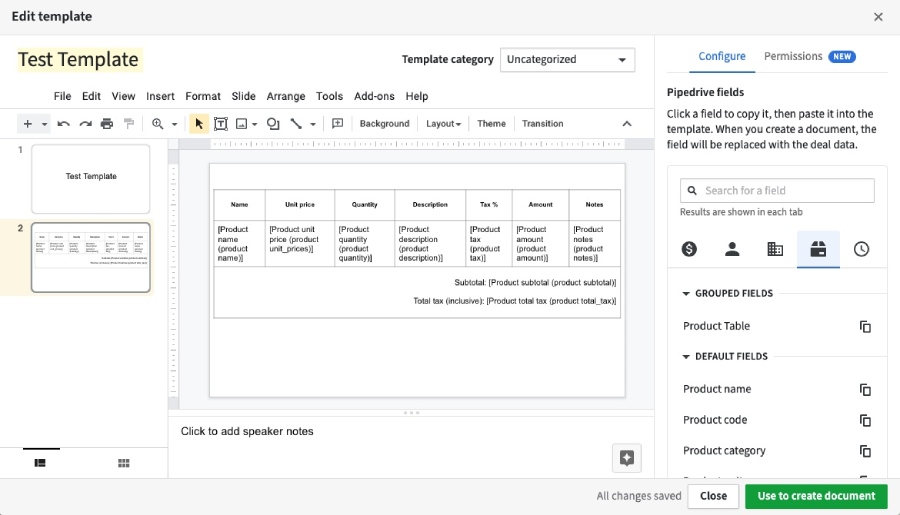
Pipedrive’s Smart Docs feature that autopopulates a selected field (Source: Pipedrive)
Our Expert Opinion
Pipedrive can convert a sales operation into an automated machine if you deploy all it offers. The system stands out by providing specialized advanced tools, such as Smart Docs, Smart Contact Data, and the AI sales assistant, in addition to traditional workflow automation features. Combine everything, and you can put nearly your entire sales process on autopilot.
Salesforce: Best for Business Health Reporting

Pros
- Customizable reports and dashboards show real-time views of business health.
- It has integrated tools for sales, email outreach, customer service, and commerce in one platform.
- It can create a payment portal and direct payment links for opportunities to boost sales productivity.
Cons
- It has no free plan, only a 30-day free trial; there is a huge price jump from Starter Suite ($25 per user, monthly) to Pro Suite ($100 per user, monthly).
- Forecast and quote management tools are locked in with Pro Suite plan ($100 per user, monthly).
- It has a sharp learning curve because of its robust and advanced features.
- You need a CRM for tracking your business health: Salesforce is known for its robust and advanced out-of-the-box reporting and analytics features. Across all plans, you can access pre-built and customizable reports and dashboards to get a real-time view of your business health. These reports allow you to monitor key success metrics, such as opportunities won, sales performance, top accounts, and revenue pipeline.
- You want an AI-powered CRM for managing deals: With Salesforce, you get smart suggestions and next-best recommendations to help you move deals along the pipeline faster. Plus, you can create a payment portal and send embedded payment links for deals in your CRM.
- You want a free or low-cost CRM for operations: While Salesforce offers a 30-day free trial, it does not have a freemium option. In addition, there is a huge price jump from the Starter Suite ($25 per user, monthly) to the Pro Suite ($100 per user, monthly).
- Alternatives: Freshsales and Bitrix24 both offer free and cost-scalable plan options for small businesses. Paid plans for Freshsales start at $9 per user, monthly, and Bitrix24 at $49 per month for five users.
- You’re seeking more affordable tools for forecast and quote management: Salesforce’s sales forecast and quote management features come at a steep price of $100 per user, monthly with its Pro Suite plan. This could be too expensive for small businesses with limited resources for CRM software.
- Alternatives: Zoho CRM’s Standard plan ($14 per user, monthly) includes sales forecasting tools. Its Professional plan ($23 per user, monthly) has an inventory module with quote generation tools. HubSpot CRM, on the other hand, lets you create and send quotes with its freemium plan.
Salesforce Monthly Pricing Plans*
Salesforce Pricing Add-ons:
- Marketing Email Sends: $10 per 1,000 monthly emails
- Web Services API Integrate with external apps using REST, SOAP, Bulk, and Streaming APIs; for Pro Suite plan : $25 per user, monthly
- Premier Success Plan Additional expert help, adoption, guidance, coaching, and live support; for Pro Suite plan : 30% of net license price
*Pricing is based on annual billing on a per-month breakdown of the Small Business plans. Monthly billing for Starter Suite is available for a higher cost. It comes with a 30-day free trial. While we update pricing information regularly, we encourage our readers to check current pricing here.
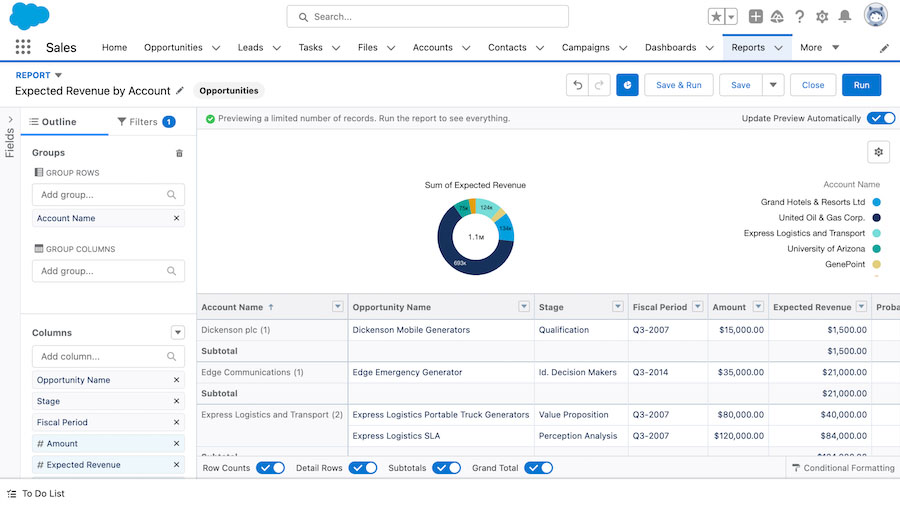
Salesforce report on expected revenue by account (Source: Salesforce Admins)
Our Expert Opinion
Salesforce’s ready-to-use, customizable reports and dashboards provide you with an accurate view of your business health in real time. AI-powered insights help you zero in on where your business is struggling so that you can take action to help you achieve your revenue goals. More than just a sales CRM, it offers marketing, service, and commerce tools on one platform to create a more seamless experience for your customers.
monday CRM: Best for Ease of Use

Pros
- It is highly intuitive to operate and leverages spreadsheet style format for data entry and low-code design for automations.
- It offers sales ops management features for rep capacity planning, onboarding, and sales material storage.
- It includes great team collaboration tools like a shareable whiteboard, file sharing and editing, and user task assignment with alerts.
Cons
- It has no free plan (just a 14-day free trial) and misleading cost of paid plans with a three-user minimum requirement.
- Data duplicate management requires a custom-priced Enterprise plan.
- Email automation and sales forecasting features are locked behind the Pro CRM plan ($28 per user, monthly).
- You need a simple operations CRM: monday CRM has a minimal learning curve since it uses a familiar spreadsheet-style format for data entry, updates, and customized fields. Once added, users can quickly toggle between different viewing options to evaluate their data. monday CRM also has low-code automation options that let teams create if/then workflows with dropdown options.
- You want a dedicated operations management module: monday CRM is unique in that it comes with dedicated tools for sales operations. These include rep headcount and capacity planning, employee onboarding tracking, sales collateral storage, and an internal knowledge base. There’s also a feature for obtaining approval from legal or security teams on contract terms.
- You need a free CRM for sales operations: While monday CRM has a 15-day free trial, it currently does not offer a free-forever plan. Instead, you can start using the platform by shelling out $12 per user, monthly, with a minimum of three users.
- Alternatives: HubSpot CRM and Freshsales are great CRMs for sales operations that offer free-forever plans.
- You want lower-priced data deduplication: Data duplicate management allows you to keep a clean database by finding and merging redundant records automatically. While monday CRM has this capability, it requires the Enterprise plan, which uses tailored pricing based on users and feature requirements.
- Alternative: Bitrix24 stands out as the best alternative—offering automated duplicate management on its Free plan.
monday CRM Monthly Pricing Plans*
*Pricing is based on annual billing on a per-month breakdown, though monthly billing is available for a higher cost. It comes with a 14-day free trial. While we update pricing information regularly, we encourage our readers to check current pricing here.
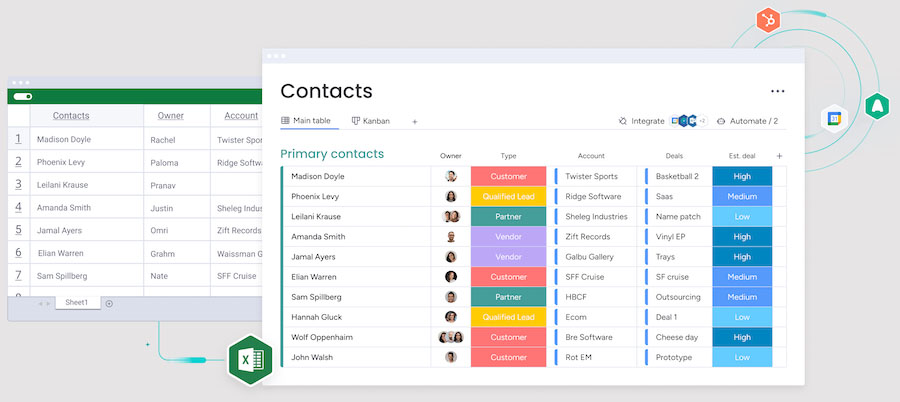
monday CRM contact list from spreadsheet data (Source: monday CRM)
Our Expert Opinion
monday CRM is the best option if your top priority is product usability. From an operations perspective, it offers a simple database for reps to access records—using a spreadsheet format familiar to most software users. We also can’t tout the automation capabilities enough. The low-code designer tools allow any user, regardless of technical skill, to easily put sales tasks and pipeline stages on autopilot.
Copper CRM: Best for Google Apps Integration

Pros
- Users can access the CRM in their productivity tools like Gmail or Google Calendar.
- It has a solid set of team collaboration tools like file sharing, user comments and mentions, and task assignment.
- It has a highly intuitive interface similar to Google apps.
Cons
- It has no free plan, only a 14-day free trial.
- There is a tier-based limit on contacts and custom fields.
- Mass email feature is not available until the Professional plan ($59 per user, monthly).
- You want to use your CRM in Gmail: Copper CRM is a Google CRM system designed to look like and integrate with Google apps. As a productivity hack, users can access the Chrome extension and put the CRM directly in their Gmail or Google Calendar interface, which are often the most commonly used apps for sales reps. From there, you can add or update records, manage tasks, and find files in one system.
- You need a simple team collaboration tool: Copper CRM is a highly intuitive CRM that looks and feels like a Google app. It also comes with a great set of team collaboration features. Users can mention one another in CRM records, assign tasks, share files, and log activity—allowing sales teams to coordinate on opportunities and ensure nothing slips through the cracks.
- You need a lot of custom data fields: A key operational challenge with Copper CRM is that you only get up to 10 different customizable data fields on the Basic plan. Unlimited custom fields require the Professional plan for $59 per user, monthly.
- Alternative: Bitrix24 offers free custom data fields with no limits on the number of unique, tailored fields.
- You want free access to mass emailing capabilities: Copper CRM’s mass emailing features do not come in until the Professional plan ($59 per user, monthly)—a relatively high cost compared to other options.
- Alternatives: Both HubSpot CRM and Zoho CRM offer free-forever plans that include bulk emailing capabilities and email templates.
Copper CRM Monthly Pricing Plans*
*Pricing is based on annual billing on a per-month breakdown, though monthly billing is also available for a higher cost. It comes with a 14-day free trial. While we update pricing information regularly, we encourage our readers to check current pricing here.
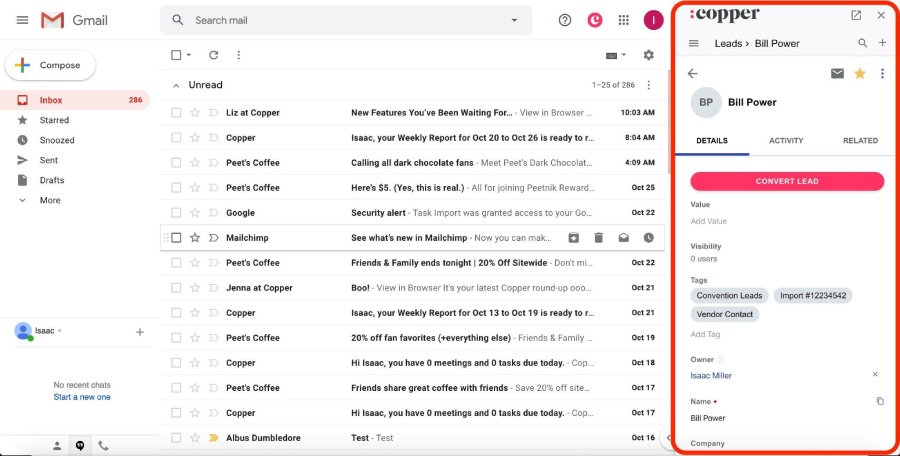
Copper CRM Chrome extension in Gmail (Source: Copper)
Our Expert Opinion
Copper CRM can optimize productivity thanks primarily to its unique Google Chrome extension. Because sales reps do most of their work through an email or calendar app, it would be ideal for them to be able to view and manage their CRM records from those systems. Copper’s extension gives you full CRM accessibility within Gmail and Google Calendar to stay better organized and help maintain work centralization.
Insightly CRM: Best for Contact Management

Pros
- It has solid contact management capabilities with custom fields and third-party cloud-based recordkeeping.
- It has built-in project management tools with automation features.
- It has data synchronization with the mobile app.
Cons
- There is a two-user limit in the Free plan.
- Telephone features require additional cost ($35 per user, monthly).
- Workflow customization and automation require a paid plan (starting at $29 per user, monthly).
- You want a robust contact management system: Insightly CRM provides recordkeeping attributes, including contact linking to organizations, record classification, contact communication history, and batch updating. It also has lead qualification, tracking, and contact management tools that make sales operations and pipeline stage movement more efficient.
- You prioritize real-time data sync on the field: Sales teams looking for an operational CRM on the go will find Insightly CRM a great choice for its up-to-date synchronization of contact data in its mobile app. You can access information on leads and clients anywhere, anytime, making it easier to carry out sales activities without complex logistics.
- You require multiple access to CRM at no cost: Insightly CRM’s free plan is limited to two users. If you’re a small business with more team members, consider other options with free-forever plans.
- Alternatives: HubSpot CRM offers a robust free plan for five users, including an intuitive lead management system. Bitrix24 is another solid free option with unlimited user allocation, especially if you want access to project management tools.
- You need a built-in telephone: Many sales teams continue to employ cold calling and telephonic communication as part of their sales process. Unfortunately, with Insightly CRM, you’ll need to subscribe to its Insightly Voice product ($35 per user, monthly) to access these features.
- Alternative: Freshsales is our top pick for operational CRM with a built-in telephone. You can access this tool even with its free plan.
Insightly Monthly Pricing Plans*
Insightly CRM Pricing Add-ons:
- Premier Support and Success Includes personalized support, proactive insights, and one-on-one technical guidance : Contact provider for a quote
- Guided Onboarding Includes guided CRM implementation, training, adoption, and consultation : $1,500 one-time fee
- Insightly Voie Integrated phone dialer with click-to-call, call logging, call recording, and call analytics; available to Professional and Enterprise plan subscribers : $35 per user, monthly with 500 minutes of talk time
*Pricing is based on annual billing on a per-month basis, though monthly billing is available for a higher cost. It comes with a 14-day free trial. While we update pricing information regularly, we encourage our readers to check current pricing here.
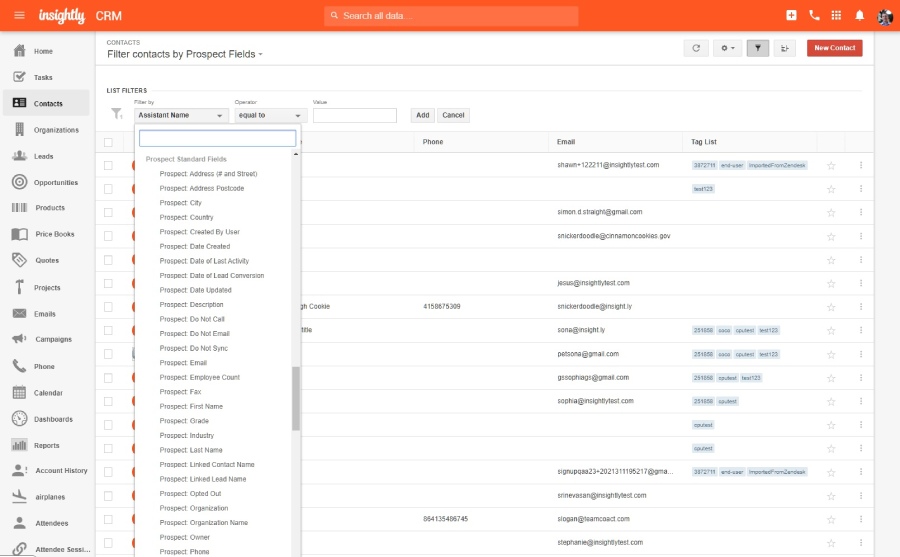
Insightly CRM’s user interface showing contact filters through prospect fields (Source: Insightly)
Our Expert Opinion
We find Insightly CRM an excellent operational CRM for businesses prioritizing a solid contact management system. Aside from its scalable record storage, relationship linking, custom fields, and data entry automation, it also has lead qualification and web-to-lead capture that help identify sales opportunities. It’s an ideal option for business-to-business (B2B) sales teams and client-based operations.
How We Evaluated the Best CRM for Operations
To determine the best operational CRM, we evaluated the essential features for managing a day-to-day sales team and helping them improve efficiency. These features cover forecasting, internal communication, and task automation. General CRM features were also considered when choosing the top CRMs for this list. We also looked at other critical product attributes, including price and user experience, in terms of product usability and solid customer support.
The tabs below offer insight into our evaluation process of the operational CRM software:
25% of Overall Score
We first looked at features vital to any CRM system, regardless of industry, company size, or whether it’s primarily used for operations management. For example, a mobile app lets teams work while on the go, while a range of third-party integration options allows teams to connect with their favorite outside applicants. We also looked at system customization and the sophistication of the reporting and analytics tools.
15% of Overall Score
This criterion looked at the all-around affordability of each CRM and its operational features. Pricing considered the total costs of each paid subscription and whether there was a freemium option for users. We also evaluated billing flexibility, such as offering annual options to save on costs.
15% of Overall Score
We evaluated niche features specific to operations management and rep productivity. Extensive workflow automation, for instance, lets you put repetitive and mundane activity on autopilot. We also looked at the task management and internal communication features included in each CRM to help stay efficient and collaborate with team members. Finally, we evaluated features that can help scale a sales operation, such as forecasting and pipeline analysis tools.
15% of Overall Score
To assess the ease of use, we checked if the provider has built-in templates or automations. We also searched reputable review sites to gauge general user sentiment regarding its learning curve and ease of setup. In addition, we considered its plan options to see if it was easily scalable.
15% of Overall Score
Extensive support enables the best possible user outcomes while using these CRM systems. We wanted the providers to be available either during extended business hours or on a 24/7 basis. We also considered the range of support channel options like phone, email, and live chat, as well as self-service resources, including a knowledge base and community forum.
15% of Overall Score
In addition to first-hand experience with these operational CRM systems, we wanted to consider real user opinions by evaluating online reviews. This lets us gauge how users felt about the features, perceived value for the price paid, and product usability while setting up, operating, and navigating the CRM system.
Frequently Asked Questions (FAQs)
An operational CRM system is a sales software with features for improving productivity, organization, and scalability. It has plenty of workflow automation to put specific tasks on autopilot, task tracking, internal communication tools for collaboration, and capacity planning capabilities, such as forecasting, which allows a manager to grow more efficiently.
HubSpot CRM is a great example of a CRM for operations because of its wide range of tools for RevOp, such as deal tracking, quote generation, email management for marketing, performance analytics, and direct third-party integrations. It offers an all-in-one solution that provides essential CRM features alongside marketing and customer service modules. Other solid operational CRM examples include Pipedrive, Freshsales, and Bitrix24.
An operational CRM is one of three types of CRMs. There are also collaborative CRM systems that focus on aligning various departments, such as sales, support, and marketing teams, by sharing data resources and coordinating activity. Then, we have analytical CRMs that prioritize finding insights and trends in customer data, pipeline activity, and the sales funnel to help improve operations and product offerings.
Bottom Line
Operational CRMs give sales teams data management, automation, forecasting, and collaboration tools to improve their day-to-day. Depending on your budget, feature priorities, and interface requirements, different CRMs will best serve your operation. For example, monday CRM is great for ease of use, while Pipedrive can automate your sales activities. HubSpot CRM, however, ranks the highest for its complete arsenal of RevOp tools.